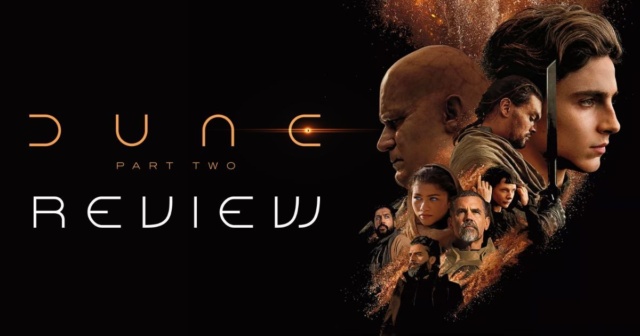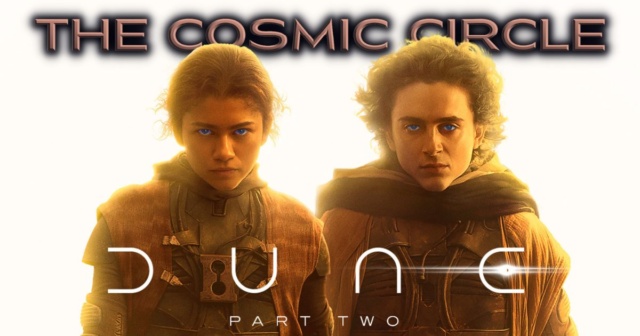‘Dune: Prophecy’ Premiere Shows Plenty of Promise
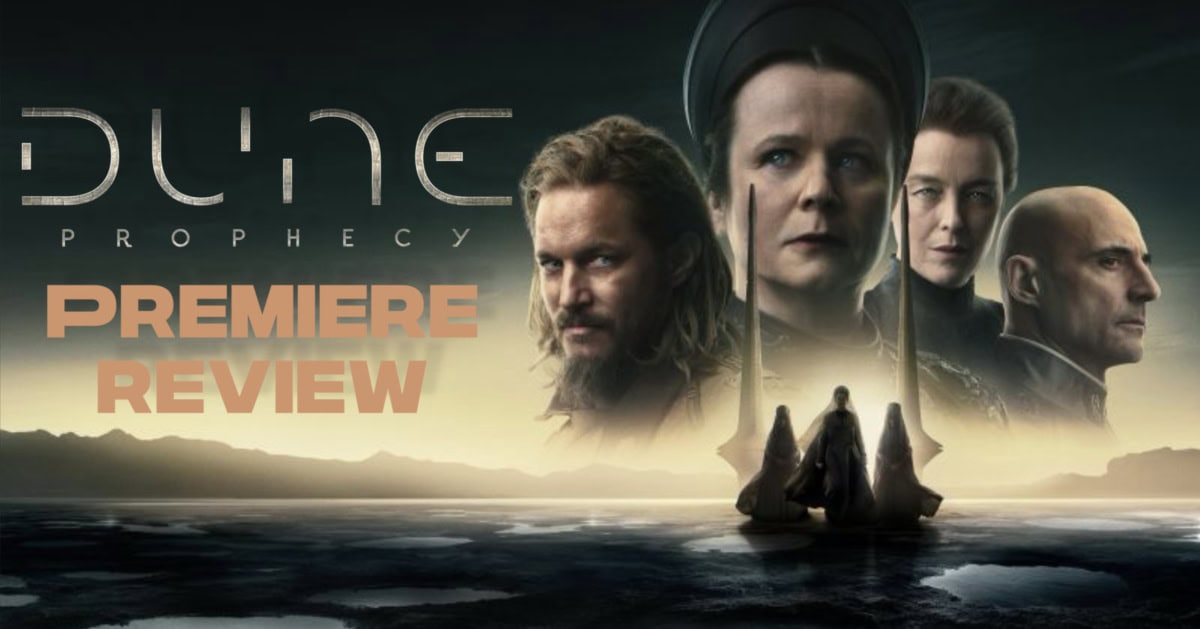
The Dune franchise has exploded in popularity in recent years after the very successful and critically acclaimed Dune Parts 1 & 2 by Denis Villeneuve. The films brought new fans to enjoy the novel it is based on by author Frank Herbert, as well as more interest and appreciation for the other novels in his Dune franchise, with Dune: Messiah set to be the next and final film Villeneuve will adapt. Despite there being only six books by Frank Herbert, after his death, his son Brian Herbert along with well known sci-fi writer Kevin J. Anderson has been expanding his late father’s universe with several books set all across the timeline of the franchise. Sisterhood of Dune, from which Dune: Prophecy takes inspiration, was published in 2011 and has since opened up a whole new plethora of stories for the franchise, especially being set 10 ‘000 years in the past.
Dune: Prophecy is the first adaptation of one of Frank and Kevin’s books, and a first for the franchise as a whole outside of Dune and Children of Dune. The six-part series, set in the same cinematic universe as the Denis Villeneuve films, will air on Sunday 17th, and brings viewers back 10 ‘000 years before the birth of Paul Atreides. I have been lucky enough to see the first episode early, which sets the season up in plenty of great ways.
Dune: Prophecy transports us back in time to the early Imperium
Dune: Prophecy being set 10,000 years before the films allows us to witness the rise of the different houses we see in the movies and the state of the universe and how things are different. The show follows the tales of Valya Harkonnen (Emily Watson), Reverend Mother and head of the Sisterhood. They are precursors to the all-knowing Bene Gesserit as they aim to increase their power across the fledgling imperium, to help control the breeding of new generations for the betterment of humanity.
On the other side, we follow the emperor of the known universe, Javicco Corrino (Mark Strong) as he battles with the politics of the houses of the landsraad and struggles to keep hold of Arakkis, aka Dune, and keep the spice flowing to his subjects. Plenty of other stories are set up surrounding these two characters also, which sets the stage for a rather interesting, intimate season as the characters’ stories become ever intertwined. Such as Princess Ynez Corrino (Sarah-Sofie Boussnina) who is to be sent away to become part of the Sisterhood and Desmond Hart (Travis Fimmel) who brings the Emperor a dire warning from his time on Arrakis.
The Harkonnen sisters, Valya and Tula, are very much the main part of Dune: Prophecy, both are considered the heads of the Sisterhood but outside of that their family line is disgraced and far from the wealth and power they find themselves with, in the far future. Emily Watson and Olivia Williams, who play Valya and Tula respectively, bring a certain eloquence and serenity to their roles. There is plenty of otherworldly wisdom from Valya as she has to juggle the lives of so many of her sisters and acolytes in training there is the same kind of calm but powerful authority that we find with the Reverend Mother in the films here too.
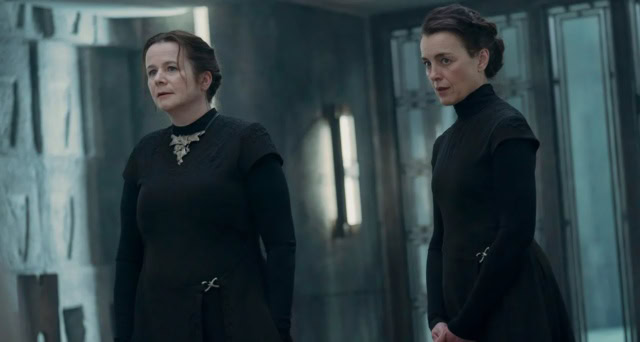
Politics and family play a big part in this new HBO series
There is a part of Dune: Prophecy that feels almost like Game of Thrones in its drama. There is plenty of talk of great houses, and Emperor Corrino is dealing with infighting amongst the houses and the politics of arranged marriages to secure the future of his own house. The great houses mentioned are swept to the sidelines in the first episode in favor of keeping the story more focused. Still, there are plenty of mentions of the ones we know from the films, such as, obviously, House Arteries, in which Keiran Atredies (Chris Mason) is the sword master for the Corrino family and gets on very well with Princess Inez. There are the Corrinos who rule the galaxy during the time of the show and 10,000 years in the future during the films, and of course, the Harkonnens, who, in the show, are far from the bald, strange black and white society we see in the films.
The show wants you to feel that it is part of the films. From the opening, which harkens back to the opening of the two films, to the theming of the sets that tries to emulate the minimalist effect that the films bring. Dune: Prophecy understands this in some aspects, but sometimes you notice the costumes can look rather basic or that some of the sets look a little cheap for this multi-million dollar show. However, the visuals of the show, such as the CGI are phenomenal, there is plenty that the showrunners carry over from the films such as the look of the shields used by characters, some of the costumes, and the look of the giant sandworms of Arakkis (that are prevalent in different ways throughout the episode) the budget is there for Dune: Prophecy in some regards and if you can overlook the TV feel of the show at times, it feels on par with the movies.
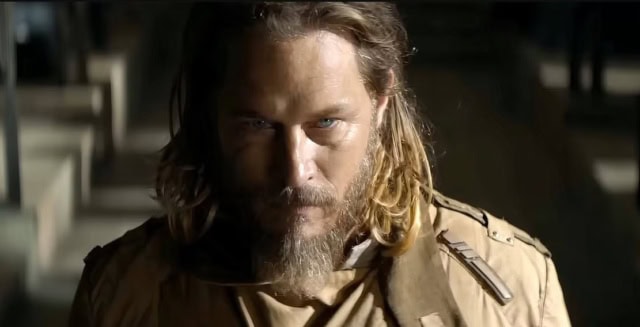
The first episode, to me, does an admirable job of setting up the show as well as the era it is set in. As previously mentioned, it is set 10,000 years in the past from the films (but in itself is still 10,000 years in our future) and around a hundred years after the “destruction of the great thinking machines,” a decades-long war against evil technology (also known as the Butlerian Jihad for book fans) that results in the simplistic look and feel of the universe.
The show helps viewers understand this is not the time of Paul Atreides and just how different a universe it is thousands of years in the past. There is a lot of exposition in the first few minutes of the show explaining this, which may well confuse some viewers and slows down the episode until everything is explained. However, the exposition shown and told was great to see as a book fan, including plenty of references to the book the show is based on, Sisterhood of Dune.
Luckily, the show takes a different turn to the book in many ways, simplifying the story and the state of the universe after the destruction of the thinking machines for the sake of an easier story (a lot happens in the book) which I can appreciate, and makes the show itself feel more timely and on part with the films despite the vast difference in eras.
Plenty of promise in the first episode of Dune: Prophecy
I would highly recommend the first episode of Dune: Prophecy to all Dune fans or even just to fans who want a new sci-fi show to watch, while there is a lot of setup for the season as a whole in the episode, which requires a lot of dialogue and exposition. It is all handled greatly and keeps you engaged with the story and questioning what will happen. The episode also ends on a phenomenal cliffhanger and which I cannot wait for the next episode to see what happens! It is a worthy watch into the wider world of Dune as a franchise.
Dune: Prophecy begins airing on HBO and streaming on Max on November 17, 2024. Are you excited to check out this new series? Let us know on social media @mycosmiccircus on X and Threads, or @TheCosmicCircus.com on Bluesky!
Dune: Part Two Review: A Cinematic Miracle

